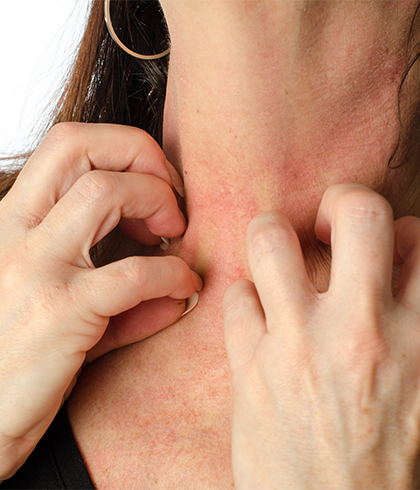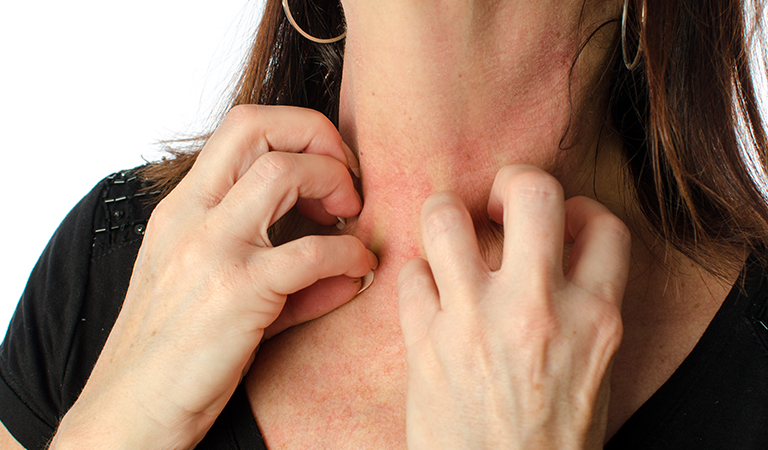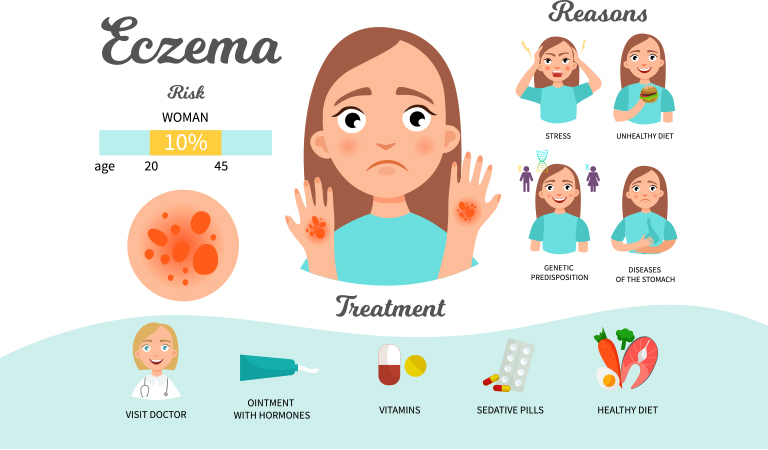

What Is The Best Way To Treat Chronic Eczema
Whether you are unlucky enough to be born with eczema skin disease or you develop it later in life; eczema can be painful, embarrassing and debilitating. According to a research study by Lloyds Pharmacy, eczematous skin can cause individuals to take time-off from work, cancel social events and avoid intimacy.
Chronic eczema is a skin rash that's often quite stubborn to get rid of. You can’t help scratching it, which can further irritate your skin. The common eczema trigger is your skin overreacting to external factors or substances, such as soaps, detergents, dust and even dry or cold air. These factors or substances can cause an intense allergic reaction rash.
What is Eczema?
Eczema is red, flaky and itchy skin, which can also crack and weep. Although a patient can be genetically predisposed to eczema; it can also be triggered by allergic etiology which could be anything from peanuts to cigarette smoke; wool to animal dander.
The most common type of eczema is atopic dermatitis (caused due to common allergies), but eczema flare-ups can also result from contact dermatitis (these allergens are alloy, nickel or rubber), nummular dermatitis (coin-shaped skin rashes), or seborrheic dermatitis (scalp eczema). Please note: identifying your allergy trigger is important for eczema treatment.
Preventing Eczema Flare-ups:
Treating chronic eczema can be challenging, but there are some preventive measures to manage eczema symptoms:
1. Do not scratch: Scratching may bring temporary relief to the itch, but it actually triggers the release of a chemical called histamine (that plays a central role as a mediator of itching) in the body. It actually causes more itching and skin infections by allowing the bacteria on the surface to penetrate into the skin. Cut your nails regularly, and whenever you get the urge to scratch, just pat on the itchy skin.
2. Moisturise your skin: You should cover your body with a mild moisturiser throughout the day. A skin doctor can prescribe different emollients. Apply these eczema remedies after a shower on damp skin, to help trap in the moisture. You can also use certain natural skin care products on the eczematous skin.
3. Monitor any food triggers: Food intolerance symptoms can be a common trigger for many eczema patients. Nutritionists suggest considering a food elimination diet, which involves cutting out common food triggers from your diet and then gradually reintroducing them to notice, if they cause an eczema flare-up. Certain foods can promote inflammation—it’s ideal to reduce your intake of sugar, refined carbohydrates, and highly processed and deep-fried food. You can include low glycemic, whole carbohydrate sources, such as oats, quinoa and sweet potato, as well as low-sugar fruits such as berries, apples and pears. Maintain ‘a food and its symptom’ journal to see if you can establish any links between what you eat and your skin condition. For allergic eczema, make sure you consume foods that are rich in omega 3 fatty acids, such as flaxseeds and walnuts.
Also read:https://www.drbatras.ae/is-it-food-intolerance-or-food-allergy

4. Natural remedies for allergies: Oat bran has been used for centuries to treat various skin conditions. Oats are rich in saponins that naturally cleanse the skin as well as beta-glucan that encourages moisture retention and protects skin from environmental allergies. You can also try using aloe vera gel on the skin rash—keep it in the fridge so it’s cool and refreshing, or drink aloe vera juice. Coconut oil can also moisturise dry skin and reduce the symptoms of eczema. You can opt for an organic, cold pressed coconut oil.
5. Take care of your stress levels: Often, there is a link between your state of mind and your skin, so set aside time to relax. It is common for eczema to flare up during stressful situations, such as a break-up or the start of a new job. Identify ways to reduce stress, such as meditation, yoga or other recreational activities. It’s also important to get enough sleep.
6. Infant eczema care: Keep a track of your child’s nail trim requirement. Keep your child’s skin covered, so that they are less likely to scratch. When dressing up your child, be sure to:
- Choose loose fitting clothes, made from soft and natural materials.
- Use natural cotton bed-sheets rather than synthetic materials that are gentle on the skin.
- Use cotton mittens and sleeves.
Homeopathy Medicines for Eczema and Itchy Skin
According to a research study published in the Journal of Integrated Standardized Homoeopathy (JISH) shows the efficacy of homeopathic medicines Sulpher and Graphites in the treatment of eczema.These remedies were administered on the basis of the eczema patient’s symptoms and on referring to the Materia Medica. Sulpher and Graphites are both well known for their action on the skin and hence showed a positive effect on eczema and itchy skin.
Certain conventional oral medications for symptoms of eczema can suppress the body’s immune system. Whereas, homeopathy treatment for eczema helps to control itching, prevents the spread of eczema and treats the symptoms of eczema, without any side-effects. Furthermore, homeopathic medications are found to be more effective than other conventional treatments, in the long-term.
So, if you are suffering from eczema, please consult a homeopathy doctor to get safe and permanent relief from this skin condition. You can also take any free eczema evaluation test in order to assess the current state of your skin disease.Then just book an appointment with a homeopathy specialist as soon as you notice skin eczema symptoms.
Key Takeaways
- Eczema can be painful and affect your daily life.
- It may cause people to miss work or social events.
- Eczema can lead to avoiding intimate situations.
- Some people are born with eczema, while others develop it later.
- Lloyds Pharmacy conducted a study highlighting these impacts.
FAQs
What causes eczema flare-ups?
Eczema flare-ups can be triggered by allergens, irritants, stress, or environmental changes like temperature and humidity. These factors can aggravate the skin, causing symptoms to worsen.
How can homeopathy help with eczema?
Homeopathy offers personalized remedies that focus on the underlying causes of eczema, promoting long-term relief. It works by stimulating the body's natural healing processes to reduce inflammation and irritation.
What are the best ways to prevent eczema flare-ups?
Prevent flare-ups by following a moisturizing skincare routine, avoiding known triggers, and maintaining a clean environment. Managing stress and avoiding extreme weather conditions can also help.
Can diet affect eczema flare-ups?
Yes, certain foods may trigger eczema flare-ups, such as dairy, nuts, or gluten. Identifying and eliminating food triggers can reduce the frequency and severity of flare-ups.
Is eczema contagious?
No, eczema is not contagious. It is a skin condition influenced by genetics, allergies, and environmental factors, but it cannot be spread through contact.

